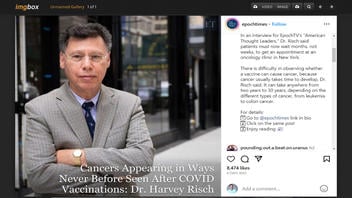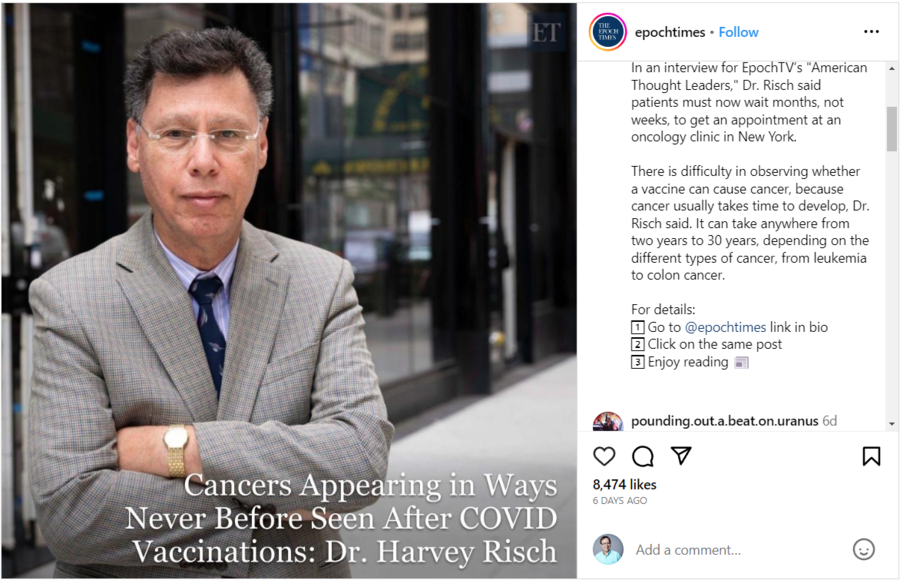
Are cancers appearing in "ways never before seen" following vaccination for COVID-19? No, that's not true: There is no scientific evidence to suggest that COVID vaccines cause or lead to the development of cancer in unprecedented ways. The Centers for Disease Control and Prevention (CDC) has also stated, "There are no data that suggest that COVID-19 vaccines cause cancer, lead to recurrence, or to disease progression."
The claim appeared in a post on Instagram (archived here) published by The Epoch Times on September 21, 2023, under the title "Cancers Appearing in Ways Never Before Seen After COVID Vaccinations: Dr. Harvey Risch." The post's caption says:
There is evidence that cancers are occurring in excess after people receive COVID-19 vaccinations, according to Dr. Harvey Risch.
Dr. Risch is professor emeritus of epidemiology in the Department of Epidemiology and Public Health at the Yale School of Public Health and Yale School of Medicine. His research has focused extensively on the causes of cancer as well as prevention and early diagnosis.
In an interview for EpochTV's 'American Thought Leaders,' Dr. Risch said patients must now wait months, not weeks, to get an appointment at an oncology clinic in New York.
There is difficulty in observing whether a vaccine can cause cancer, because cancer usually takes time to develop, Dr. Risch said. It can take anywhere from two years to 30 years, depending on the different types of cancer, from leukemia to colon cancer.
For details:
1️⃣ Go to @epochtimes link in bio
2️⃣ Click on the same post
3️⃣ Enjoy reading 📰
This is what the post looked like on Instagram at the time of writing:
(Source: Instagram screenshot taken on Wed Sep 27 18:55:35 2023 UTC)
The interview
The social media post directs readers to a video interview (archived here) with Dr. Harvey Risch on EpochTV's "American Thought Leaders." An article featuring the same interview (archived here) also appears on The Epoch Times website.
Risch is a professor emeritus of epidemiology in the Department of Epidemiology and Public Health at the Yale School of Public Health and Yale School of Medicine. The Epoch Times reports his claims that "patients must now wait months, not weeks, to get an appointment at an oncology clinic in New York." In the story, Risch says:
What clinicians have been seeing is very strange things: For example, 25-year-olds with colon cancer, who don't have family histories of the disease--that's basically impossible along the known paradigm for how colon cancer works--and other long-latency cancers that they're seeing in very young people. ...
Those are the initial signals that we've been seeing, and because these cancers have been occurring to people who were too young to get them, basically, compared to the normal way it works, they've been designated as turbo cancers.
While Risch drops plenty of purported observations during the interview, he provides no data or study information to back up his claims.
What is 'turbo cancer'?
Risch uses the term "turbo cancer" during the interview. Although "turbo cancer" sounds scary, it is not a recognized term in mainstream medicine or science. A Lead Stories search (archived here) for "turbo cancer" in the National Library of Medicine, the world's largest biomedical library, didn't return any results.
Dr. David Gorski, a surgical oncologist with the Cancer Biology Program at Wayne State University's School of Medicine, dismissed the notion of "turbo cancer" in an article published December 19, 2022, in Science-Based Medicine called "Do COVID-19 vaccines cause 'turbo cancer'"? He said:
Over the last several months, antivaxxers have been claiming that COVID-19 vaccines cause 'turbo cancer', cancers (or cancer recurrences) of a particularly aggressive and fast-growing variety diagnosed in younger and younger patients. 'Turbo cancer' is not a thing, and the evidence cited is as weak as any antivax 'evidence', including anecdotes and misinterpretation of epidemiology.
Centers for Disease Control and Prevention
The CDC's Immunization Safety Office told Lead Stories in a September 27, 2023, email that "There is no evidence to date indicating that COVID-19 vaccines cause cancer of any sort." The agency's response continued:
The authorized and approved COVID-19 vaccines are being administered under the most comprehensive and intensive vaccine safety monitoring effort in U.S. history. Monitoring involves multiple complementary ongoing systems: 323652-A_COVID-19_VaccineSafety_MonitoringSystems_v9.pdf (cdc.gov). After more than 676 million doses administered, safety monitoring has not established an association between COVID-19 vaccination and an increased risk for any cancers. There are no data that suggest that COVID-19 vaccines cause cancer, lead to recurrence, or to disease progression. Furthermore, COVID-19 vaccines do not change your DNA (i.e., your genetic code). More information is available on this from the National Cancer Institute at COVID-19 Vaccines and People with Cancer - National Cancer Institute.
Food and Drug Administration
The Food and Drug Administration (FDA) told Lead Stories in a September 27, 2023, email that there's nothing to support the cancer claim in the article. Cherie Duvall-Jones, a press officer at the FDA, provided the agency's response. It said:
Extensive monitoring of adverse events reported after vaccination with authorized and approved COVID-19 vaccines to the Vaccine Adverse Event Reporting System (VAERS) does not show a safety signal for any type of lymphoma or other cancers, including aggressive tumors.
COVID-19 vaccines have undergone--and continue to undergo--the most intense vaccine safety monitoring in U.S. history. The FDA and CDC stand firmly behind the safety and effectiveness of the mRNA COVID-19 vaccines, which are fully supported by the available scientific data. Staying up to date on vaccination is the best way to reduce the risks of death and serious illness or hospitalization from COVID-19, in addition to providing a modest benefit in the prevention of infection.
The evidence is overwhelming that the benefits of vaccination against COVID-19 clearly outweigh the risks. However, like every other medical intervention, there are potential adverse effects from vaccination. Reports of death or serious adverse events from COVID-19 vaccines are rare and are far outweighed by the benefits of these vaccines for every age group.
Vaccine Adverse Event Reporting System
In the United States, VAERS, which the FDA co-sponsors with the CDC, operates as a crude early warning system and not as a database for the quantification of specific outcomes following vaccination.
Anyone with internet access can add a report to the VAERS list of reports. The public access link to it expressly warns against unwarranted conclusions based on VAERS material because the list only provides a tally of unverified notes about any health event people experience after they are vaccinated.
The list itself cannot be used to prove or quantify, since all it shows is a chronological correlation, not the causal link that would be more difficult to establish. It's the equivalent of a police precinct's running "blotter" reports that may serve as a starting point for police work, not an endpoint.
Memorial Sloan Kettering Cancer Center
The Memorial Sloan Kettering Cancer Center calls the idea that mRNA vaccines can cause cancer a myth. The hospital's website says:
None of the vaccines interact with or alter your DNA in any way, and therefore cannot cause cancer.
Messenger RNA (mRNA) is not the same as DNA and cannot be combined with DNA to change your genetic code. Here's now mRNA vaccines actually work:
The mRNA vaccines use a tiny piece of the coronavirus' genetic code to teach your immune system how to make a protein that will trigger an immune response if you get infected. The mRNA is fragile and it delivers the instructions to your cells to make antibodies against SARS-CoV-2. The mRNA does not enter the nucleus of the cell -- the part that contains your DNA.
Therefore, there is no truth to the myth that somehow the mRNA vaccine could inactivate the genes that suppress tumors.
About The Epoch Times
Once a fringe newspaper put out by an obscure Chinese religious group, The Epoch Times has become an influential news outlet favored by some conservatives, thanks to its embrace of Donald Trump and its strong anti-Communist slant.
Read more
Additional Lead Stories fact checks of claims related to vaccines can be found here.
Other Lead Stories fact checks on stories by The Epoch Times can be found here.


















